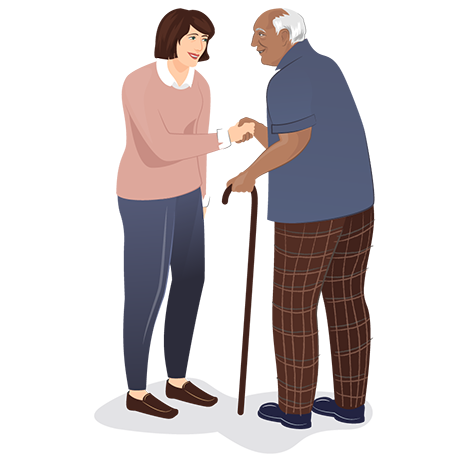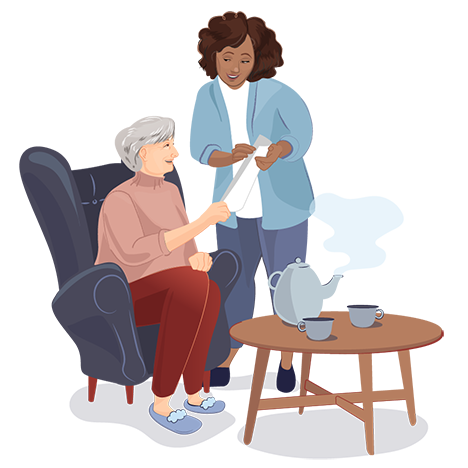
Dementia Home Care: A Guide



Speak to one of our experts
Our friendly experts are here to help from 9am to 7pm, 7 days a week.
In this guide, we provide help and advice for those considering dementia live-in care for their loved one. As a live-in care agency with years of experience, we can provide tailored support and live-in care for a range of illnesses including dementia. For more information on how dementia care at home works, read on.
 What is involved in dementia home care?
What is involved in dementia home care?
Live-in dementia care is a service where a specialist live in carer lives in with a person living with dementia. The live-in carer will be a companion and friend, while providing specialist dementia care as and when it is needed. Dementia affects people in different ways, which is why dementia home care involves a tailored care plan for the elderly person. Dementia is a progressive disease that can change a person over time, and the ability to adapt to this in order to provide the right care when it is needed is a speciality of dementia carers, and a reason why live-in care for dementia is often favoured to a care home.
As well as assisting with domiciliary and medication needs, a dementia home carer can also help with personal care needs such as washing, dressing and getting ready for bed. These care services are all available with dementia home care, and provide reassurance to families up and down the country whose loved one is at a point of needing help with their care.
Read more about how live in dementia care works in our guide: What is Live in Care?
What are the stages of dementia?
Early (mild) Stage
In the early stages of dementia, people are usually still very independent and any care needs are often managed by family members. Occasionally at this early stage, memory lapses can occur, so medication reminders and appointment reminders might be needed. It can be important at this time to make future care plans.
Middle (moderate) Stage
During the middle-stage of dementia, care requirements increase as a sufferer’s memory becomes more affected. Recognition of familiar faces and places decreases, and people living with moderate dementia may be a risk to themselves outside of the home. For example, your loved one may become lost in an area in which they know or may need assistance with odd jobs that happen outside of the home. Behaviour and mood can also change with the person with dementia, and if an elderly person is living with moderate dementia, they may become more erratic and display signs of uninhibitedness. Support is often needed in the form of personal care and domiciliary care, as this ensures your loved one is looked after, eats well and can be as comfortable as possible at home. A key factor in managing dementia is providing routine, structure, and consistency, all of which help to reduce anxiety and stress.
Late (severe) Stage
During later stages of dementia, an individual will usually require intensive care at all hours of the day. This is because at this stage the individual will likely be exhibiting confusion, poor communication, unpredictable behaviour and memory loss. It is at the severe stage of dementia that an elderly person may require dementia care around the clock, and it is at this point that care options should be truly considered so the best solution is found.
Live-in care for dementia is often the perfect solution for a person living with the early stages of dementia, where their care is manageable at home in a familiar environment. You can speak to a member of our care team to find out more about how our live-in care services can help.
What can a live-in carer do?
 A live-in carer will live within the individual with dementia’s home, and offer companionship and care services throughout the day and the night if necessary. For many elderly people with dementia live-in carers, the familiarity of a helping hand can make an incredible difference. Live-in dementia carers can support the needs of the individual and provide tailored care, which will vary from person to person. Dementia affects people differently, and whether it be incontinence care, domiciliary care or assistance with taking medication, a trained dementia carer will work alongside relatives and other healthcare professionals to ensure the right kind of care is provided at any time.
A live-in carer will live within the individual with dementia’s home, and offer companionship and care services throughout the day and the night if necessary. For many elderly people with dementia live-in carers, the familiarity of a helping hand can make an incredible difference. Live-in dementia carers can support the needs of the individual and provide tailored care, which will vary from person to person. Dementia affects people differently, and whether it be incontinence care, domiciliary care or assistance with taking medication, a trained dementia carer will work alongside relatives and other healthcare professionals to ensure the right kind of care is provided at any time.
If the person being cared for requires round the clock care, then options such as contacting a waking night carer can be considered.
How to best care for a loved one with dementia
It can be difficult for family and loved ones to care for someone with dementia, because it may be a long, stressful and emotional journey. Since there is no cure and the disease progressively worsens, caring duties will become more labour-intensive with time. It can also be incredibly difficult to watch a loved one’s memories and skills disappear. As the disease worsens, your loved one may lose awareness and recognition of who you are and appreciation will diminish.
If you do decide to help care for a loved one with dementia, it is important to:
- Schedule and establish a daily routine
- Involve the person in as much as possible to help them retain their independence
- Discuss personal choices, but not too many. For example, offer different options for meal times.
- Provide simple instructions, as people with dementia understand clear, one-step communication best
- Try to avoid the person napping too much, as this can disrupt night-time sleep
- Reduce distractions to help them maintain focus
- Create a safe environment for them; use locks on medicine cabinets, check water temperature, watch out for fire hazards
- Be patient and flexible
How does live-in care for dementia work?
Live-in dementia care can be similar to elderly live-in care but it is specifically tailored towards someone with dementia. Dementia carers will be trained to be able to manage worsening symptoms and problematic behaviours as dementia progresses. With specialist dementia live in care, a live-in carer will be able to recognise the potential issues associated with the manifestation of the disease and manage these as they unfold. They will be equipped to also prepare for potential situations that may arise so as to be able to better manage and support the person suffering from dementia.
A live in dementia carer will also understand how to help maintain low levels of stress for the individual, and they will cater to the specific needs of an individual with dementia, often incorporating activities and experiences that are meant to stimulate one’s memory. In addition, they provide assistance with activities of daily living, prepare meals, and help to provide family support, similarly to regular live-in carers. A carer will live in the home of the person being cared for and therefore a live-in carer often becomes a companion for the cared-for person and they can be best placed to support with informing medical professionals of any changes in the health and well-being of the individual.
Can a person with dementia live at home? 
People with dementia are able to live at home as long as they have the appropriate level of care to support them so they are safe and well in their own homes. In the early stages of dementia, a person may appear to be functioning well in a familiar environment, such as their home, and daily tasks may be achieved independently. However, as dementia progresses, and when they are in unfamiliar situations, the person with dementia will need to rely more on others around them to support them to achieve their daily tasks, as their memory and problem-solving may fail them. It is important that the correct level of support is there so that they do not get into situations where they may be at risk of harm or neglect. For instance, an elderly person with dementia may struggle to orientate themselves to a new place and they may need support with getting back home.
A live in dementia carer will be able to adapt to these situations and provide the right support so that an elderly person stays safe, while still encouraging them to leave the house and engage in activities that they are used to. This balance is essential to keep their brain engaged and work on cognitive function and mental health.
Dementia care can be provided in a care home too, and this option may be picked by loved ones if they think a care home is better suited to meet the needs of the elderly person. However, dementia help at home may be a preferred choice by the family, particularly in the early stages of dementia, because it can mean their loved one is able to stay in their safe, homely environment, which can help make the person living with dementia feel more comfortable. It can also be helpful for someone with dementia to keep to a routine, that can be disrupted if they move to a care home. Loved ones may also feel that a live-in carer can provide one-to-one bespoke care, while allowing an elderly loved one to stay at home in familiar surroundings.
You can read more about your options in our guide: Live in care vs care home.
How do I find a live-in caregiver?
A live-in care agency can work with you to provide specialist dementia live in care to suit the needs of the person being cared for. The agency should take the time to understand your individual needs and circumstances and then recommend an appropriately skilled and experienced live in carer.
How we can help
At The Live in Care Company, we will make the process of finding and choosing a live in carer hassle-free straightforward – and that includes carers who are experienced and trained in supporting their client with dementia.
Our expert team will be happy to speak to you and will take the time to understand your situation. We will always strive to listen, understand, and put the needs of your loved one first. Reach out to us today to arrange live-in care or explore our live in care services for more.






